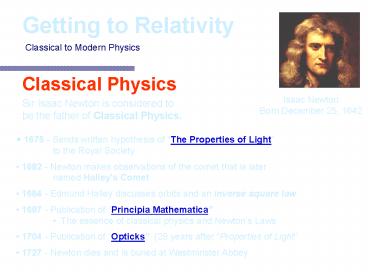Getting to Relativity PowerPoint PPT Presentation
1 / 6
Title: Getting to Relativity
1
Getting to Relativity
Classical to Modern Physics
Classical Physics
Isaac Newton Born December 25, 1642
Sir Isaac Newton is considered to be the father
of Classical Physics.
- 1675 - Sends written hypothesis of The
Properties of Light - to the Royal Society
- 1682 - Newton makes observations of the comet
that is later - named Halleys Comet
- 1684 - Edmund Halley discusses orbits and an
inverse square law - 1687 - Publication of Principia Mathematica
- The essence of classical physics and Newtons
Laws - 1704 - Publication of Opticks (29 years after
Properties of Light - 1727 - Newton dies and is buried at Westminster
Abbey
2
Classical Physics
The Industrial Revolution
1740 - 1780
- spawned by the advent of the
Steam Engine
1851
Foucaults Pendulum
- demonstrates the rotation of the earth
1869
Periodic Table
- Dmitri Mendeleev organizes all known elements
1873
Electromagnetic Theory
- Maxwell seems to resolves the wave vs. particle
debate - Light is considered to be a uniquely interacting
electric and - magnetic field called an
Electromagnetic Wave
3
Classical Physics
Discovery of X-rays
1895
- Wilhelm Conrad Roentgen
1896
Discovery of Radioactivity
- Becquerel discovers radioactivity
- Marie and Pierre Curie further the work
1897
Discovery of the Electron
- J.J. Thomson discovers the electron
4
Classical Physics
Reaches Its Limit
As the end of the 19th Century approaches
scientists are feeling confident and satisfied
with their understanding of the world around
them. The only remaining puzzle seems to be the
structure of the atom - Is it a solveable puzzle?
It is assumed that simple application of current
theory will yield the true nature to the atom and
its nucleus.
This Did NOT Work!
5
Modern Physics
- Two radical clever concepts are introduced
- Quantum Theory - Max Plank 1900
- Describes the nature of the subatomic world.
- Relativity Theory - Albert Einstein 1905
- Describes the nature of space and time.
http//www.pbs.org/wgbh/nova/einstein/
6
The Special Theory of RelativityChapter 11
- Homework
- Read pages 463 - 472
- Answer 11.1 Section Review pg. 472 4,5
- Compose a written response to the
question Why do you think the Special Theory
of Relativity was and is considered to be so
radical and profound?

